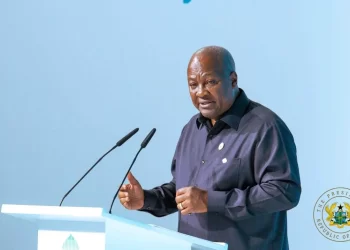The Chief Executive Officer of the Ghana Gold Board (GoldBod), Sammy Gyamfi, has praised the establishment of GoldBod, stating that it has addressed significant lapses in the previous system, helping curb gold smuggling and bringing order to Ghana’s gold trade.
He pointed out that the earlier structure, operated by the Precious Minerals Marketing Company (PMMC) and involving several state agencies without clear coordination, created loopholes that were exploited by smugglers.
Gyamfi described the former system as disorganised and lacking regulatory coherence, leading to significant revenue losses for the country.
A historic turnaround in ASM gold exports
Speaking at the Mining in Motion Summit in Accra, Mr Gyamfi highlighted the pivotal role of the newly established board in the government’s broader strategy to revitalise the Ghanaian economy.
GoldBod has recorded a historic breakthrough in gold exports, purchasing and exporting 11 tonnes of artisanal small-scale (ASM) gold valued at $1.172 billion in May 2025 alone.
From February to May 2025, PMMC—now GoldBod—exported ASM gold worth over GH₵40 billion (approximately $4 billion), overtaking exports from Ghana’s large-scale gold mining sector for the first time in the country’s history.
Total ASM gold exports from January to May reached a remarkable 41.5 tonnes.
Monthly Performance Breakdown
In January, PMMC purchased 6.17 tonnes of gold valued at $506 million, averaging 1.54 tonnes per week.
February saw a slight increase to 6.55 tonnes worth $571 million (1.63 tonnes per week).
March purchases rose to 7.81 tonnes valued at $699 million (1.95 tonnes per week).
By April, when GoldBod became operational, monthly procurement jumped to 9.2 tonnes at a staggering $889 million—averaging 2.3 tonnes per week.
This performance reflects a broader transformation of Ghana’s previously disjointed gold trading system and marks a significant milestone in the fight against illegal gold smuggling.
A new era in gold trade regulation
Ghana, Africa’s top gold producer, has long struggled to fully harness its mineral wealth for national development.
Despite its vast gold endowment, poor regulation, fragmented oversight, and widespread smuggling have crippled earnings from the ASM sector for years.
With broad stakeholder consultations and a clear legal mandate, GoldBod has absorbed the responsibilities of the former PMMC, streamlining Ghana’s gold trade into a coherent, regulated framework.
GoldBod is now the sole authorised buyer and exporter of ASM gold in Ghana and may also purchase from large-scale producers under the state’s preemption rights.
It has already implemented aggressive regulatory and aggregation measures, capturing over 90% of all ASM gold.
Licensing and compliance measures
To deepen reforms, GoldBod has begun licensing all gold trading actors under strict codes of conduct aligned with anti-money laundering and counter-terrorism financing (AML/CFT) protocols. These categories include aggregation, buying, refining, smelting, transport, and export partnerships.
Foreigners are barred from directly purchasing gold in the local market but may engage through partnerships or apply for licenses to establish refineries or jewellery manufacturing operations.
Looking ahead, GoldBod plans to deploy a digital supply chain traceability system before year’s end.
Economic strategy and policy vision
Gyamfi described GoldBod as an integral part of President John Dramani Mahama’s economic recovery agenda, particularly in light of recent economic challenges.
“The President made it clear right from the outset that GoldBod was central to his economic revitalisation agenda,” Mr Gyamfi stated.
He explained that with Ghana’s traditional sources of foreign exchange dwindling, it became essential to identify innovative local solutions to bolster the economy.
“We had to think outside the box and work with the central bank to explore local opportunities, and one of those is the Gold for Forex programme of the Bank of Ghana,” he added.
According to him, GoldBod will focus on increasing gold purchases and legal exports to boost foreign reserves—seen as critical to stabilising the cedi and strengthening the economy.
Broad support and legal foundation
Mr Gyamfi stressed that the establishment of GoldBod was not a unilateral decision by the government, but the result of extensive stakeholder consultation.
“We didn’t sleep; we worked with various stakeholders to develop what some have said is one of the best laws we have as a country—the GoldBod Act 2025 (Act 1140),” he stated.
He noted that the process involved collaboration with civil society organisations, traditional authorities (nananom), small-scale miners, traders, and the media.
The creation of the Board received overwhelming backing from stakeholders, who recognised it as a vital intervention to combat years of disorder in the gold sector.
“All the patriotic Ghanaians we engaged and the various civil society organisations saw GoldBod as an imperative—an urgent imperative—to stop this mess,” he said.
Central role in Ghana’s gold trade
Gyamfi noted that GoldBod now functions as the central authority regulating the trade, issuing licenses to all players, and enforcing a unified code of conduct.
“We now have a central agency streamlining and structuring gold trading, licensing all players involved in the trade, and ensuring that everybody adheres to one common code of conduct,” he explained.
He added that the new framework not only ensures legal and responsible sourcing but also helps the country retain vital foreign exchange earnings and revenue from its gold exports.
“This ensures that we are able to get the forex associated with the gold we buy and the revenue that we desperately need for the development of the country,” Mr Gyamfi remarked.
GoldBod’s mandate and outlook
The newly established agency is poised to bring lasting order and transparency to Ghana’s gold trade by streamlining operations and cracking down on smuggling.
According to Mr Gyamfi, the pre-GoldBod environment involved multiple state agencies buying gold without coordination, creating loopholes that smugglers readily exploited.
GoldBod was established under the GoldBod Act, 2025 (Act 1140), as part of the government’s economic recovery strategy. Its core mandate is to oversee gold purchasing, regulate exports, and enforce transparency across the gold trade—measures expected to boost foreign reserves and close avenues for illicit activity.












